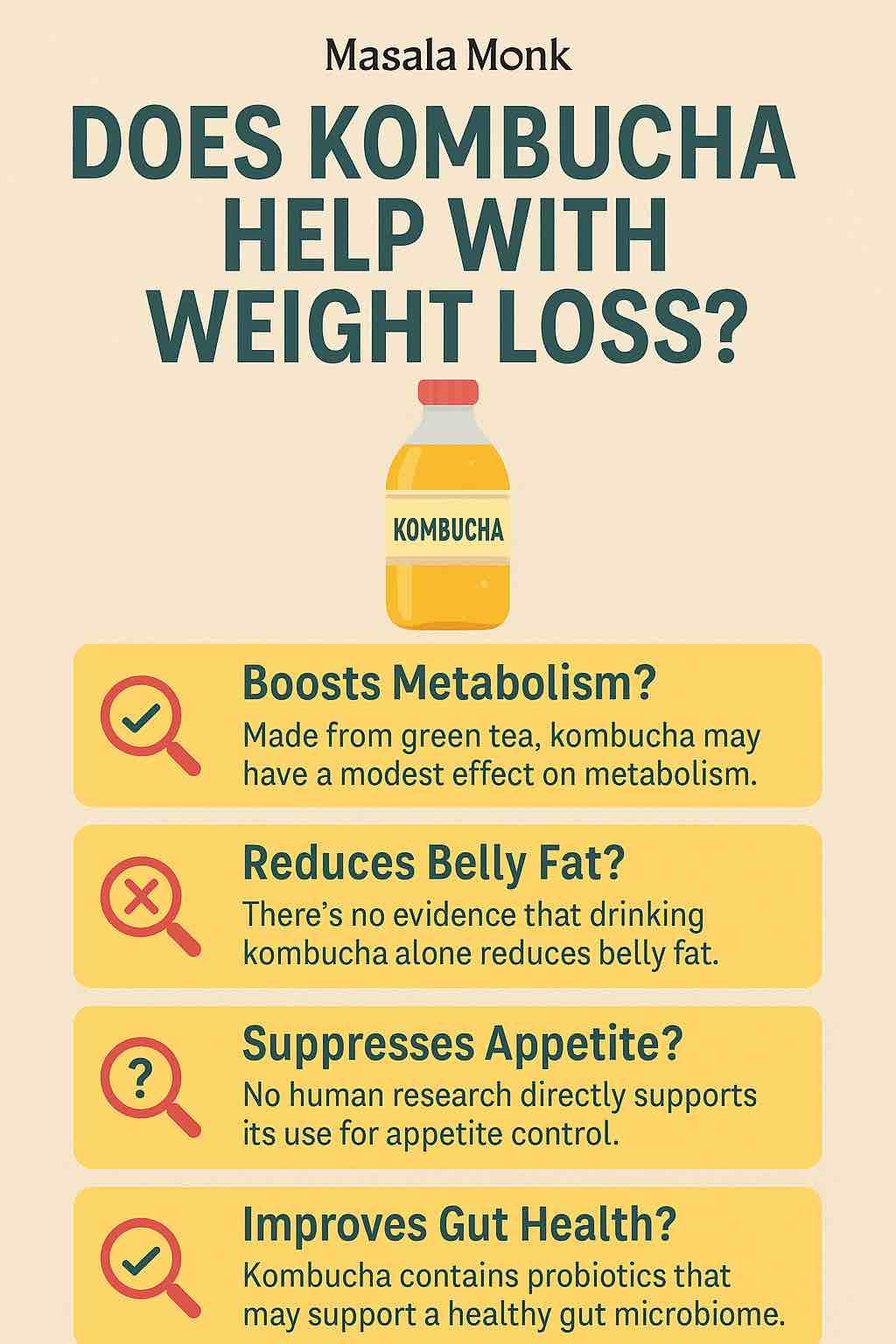
Kombucha has exploded in popularity in recent years, becoming a staple in the refrigerators of health-conscious consumers. Touted for its probiotic content, detoxifying properties, and ability to aid weight loss, kombucha is often marketed as a miracle drink. But does it actually help you shed those extra pounds, or is it just another health fad?
In this post, we’ll dive deep into the science behind kombucha and weight loss, examine the most recent research, and separate the hype from the evidence. Whether you’re already a kombucha enthusiast or a curious skeptic, this guide will give you a balanced, practical view of what this fizzy drink can (and cannot) do for your waistline.
What is Kombucha? Kombucha is a fermented tea made by adding a symbiotic culture of bacteria and yeast (SCOBY) to sweetened black or green tea. Over 7–10 days, this mixture ferments, producing a slightly tangy, effervescent beverage rich in probiotics, organic acids, B vitamins, and trace amounts of alcohol and sugar.
Key Components of Kombucha:
- Probiotics: Live microorganisms that may support gut health
- Organic Acids: Such as acetic acid, which may influence metabolism
- Polyphenols: Antioxidants derived from tea
- Trace Alcohol: Usually under 0.5%, naturally occurring from fermentation
- Residual Sugar: Amount varies by brand and brew
Common Weight Loss Claims: Myth or Reality? Many kombucha marketing campaigns and blog articles claim that it can:
- Boost metabolism
- Burn belly fat
- Suppress appetite
- Detox the body
- Improve gut health to aid weight regulation
Let’s explore what the research actually says.
1. Metabolism Booster: A Grain of Truth Kombucha made with green tea contains catechins like EGCG, which have been shown to increase fat oxidation and slightly boost metabolism. Additionally, acetic acid (found in both kombucha and vinegar) has demonstrated modest effects on fat metabolism in animal studies.
However, the concentrations in kombucha are generally low, and there is little direct evidence from human trials showing a significant metabolic boost from drinking kombucha alone.
Bottom Line: Possibly helpful in a minor way, especially if replacing sugary beverages.
2. Belly Fat Burner: Fiction Despite widespread claims, no human studies have shown kombucha specifically reduces visceral or abdominal fat. Most of this hype is extrapolated from green tea and vinegar studies or anecdotal evidence.
Bottom Line: There is no scientific support for kombucha as a belly fat buster.
3. Appetite Suppression: Inconclusive Carbonation and acetic acid may mildly increase satiety. Some users report feeling fuller after drinking kombucha. However, there are no peer-reviewed studies that validate this effect in humans.
Bottom Line: May help some people curb snacking, but it’s far from a guaranteed appetite suppressant.
4. Detox Claims: Marketing Gimmick Kombucha is often marketed as a detox drink, but this is misleading. Your liver and kidneys do the heavy lifting when it comes to detoxification. While kombucha does contain antioxidants and may support liver function, it doesn’t ‘flush toxins’ from your body.
Bottom Line: Detox claims are exaggerated. Healthy liver support? Maybe. A true detox? No.
5. Gut Health and Weight Management: The Most Promising Link Recent studies in 2024 and 2025 have shown that kombucha may positively influence the gut microbiome. In a Brazilian RCT, obese individuals who drank 200 mL/day of kombucha for 8 weeks saw beneficial microbial shifts, including an increase in Akkermansia muciniphila and butyrate-producing bacteria—both associated with improved metabolic health.
Another study found that kombucha improved GI function (e.g., better bowel movements, reduced bloating) and preserved gut barrier integrity during a calorie-restricted diet. While these effects didn’t translate into more weight loss directly, they support the idea that kombucha can be a helpful addition to a broader weight-loss regimen.
Bottom Line: Gut health improvements are real and may indirectly support weight management.
Practical Tips for Using Kombucha Wisely If you’re looking to integrate kombucha into your weight loss routine, here’s how to do it smartly:
- Watch the Sugar: Choose brands with less than 5g of sugar per serving.
- Mind the Calories: Kombucha can contain 30–100 calories per bottle.
- Start Small: Begin with 4–8 oz/day to assess tolerance.
- Don’t Rely on It: Use kombucha to complement, not replace, a healthy diet.
- Avoid Homebrew Hazards: Improper fermentation can lead to contamination.
Conclusion: Worth a Sip, But Not a Silver Bullet Kombucha offers several benefits, particularly for gut health, and may have a small supportive role in weight management. However, it is not a magic drink that will melt fat or replace healthy habits. The best results come from using kombucha as part of a balanced lifestyle that includes proper nutrition, physical activity, and mindfulness.
So, enjoy your fizzy tea—just don’t expect it to do the heavy lifting for your weight loss goals.
✅ Frequently Asked Questions (FAQs)
1. Does kombucha actually help with weight loss?
Kombucha may support weight loss indirectly by improving gut health and reducing inflammation. However, it doesn’t burn fat or boost metabolism significantly on its own. Use it as part of a healthy lifestyle, not a primary weight-loss tool.
2. How much kombucha should I drink for health benefits?
Start with 4–8 ounces (120–240 mL) per day. Some people tolerate more, but excessive intake can lead to bloating, overconsumption of sugar, or even mild alcohol effects.
3. What is the best time to drink kombucha for weight loss?
There’s no ideal “fat-burning” time, but drinking it before meals may help with satiety. Avoid late evening consumption if caffeine or acidity affects your sleep.
4. Are all kombucha brands good for weight loss?
No. Some commercial brands contain high sugar and calorie content. Look for low-sugar options (under 5g per serving) and check labels carefully.
5. Can kombucha reduce belly fat?
There is no evidence that kombucha specifically targets belly fat. This claim is a common marketing exaggeration not supported by human studies.
6. What should I look for in a kombucha if I’m watching my weight?
Prioritize:
- <5g sugar per serving
- Organic or raw (for live cultures)
- Short, clean ingredient list
Avoid kombuchas with added juice, sweeteners, or artificial flavors.
7. Is homemade kombucha better than store-bought for weight loss?
Homemade kombucha can be more potent in probiotics and lower in sugar if brewed properly. But it comes with contamination risks if not done hygienically. If you’re new to brewing, stick to reputable store brands.
8. Does kombucha suppress appetite?
Some people feel fuller after drinking kombucha due to carbonation and acidity, but there’s no clinical evidence showing consistent appetite-suppressing effects.
9. Can I drink kombucha while fasting or on a keto diet?
Many low-sugar kombuchas are compatible with keto and intermittent fasting (especially if under 2g carbs). But always check the nutrition label and ensure it doesn’t break your macro goals.
10. What side effects should I be aware of?
Potential issues include bloating, digestive upset, mild alcohol effects, or allergic reactions. People with compromised immunity or histamine intolerance should consult a doctor before consuming kombucha regularly.










